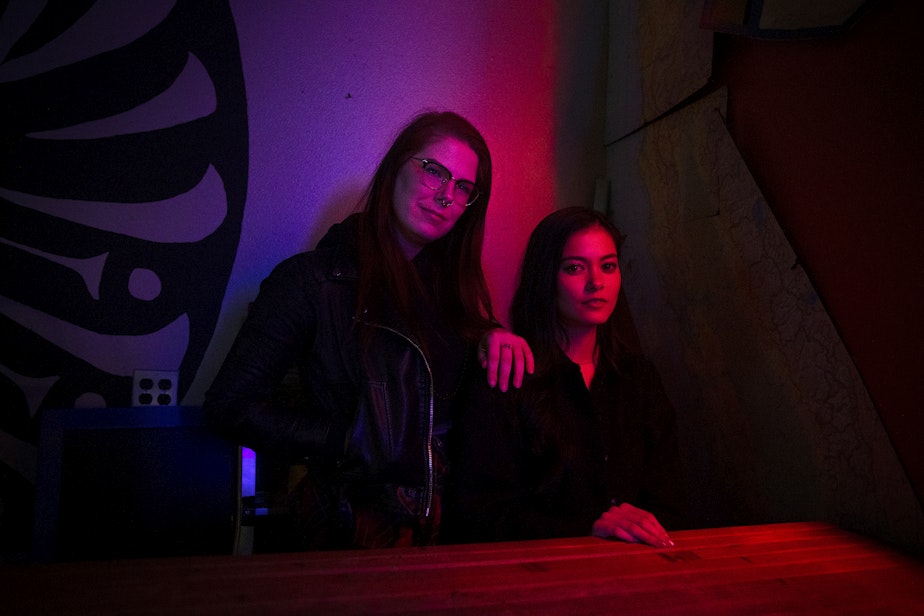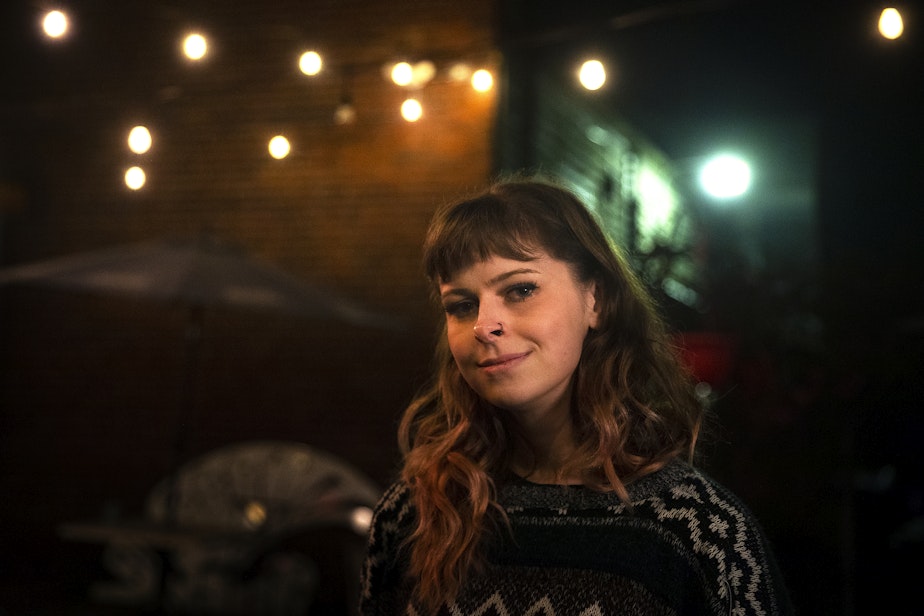Strippers say Washington state is terrible for dancing. They want a 'bill of rights' to fix that

Madison Zack-Wu’s difficult childhood meant she needed to support herself from a young age. At 18, stripping became her path to financial independence, allowing her to finish high school and pursue an associate’s degree. She valued the flexibility and steady income, but she started to notice problems with her workplace.
Clubs struggled to make money, which created safety issues for dancers. The first club she worked at didn’t employ a security guard, for example.
Washington’s ban on alcohol in strip clubs made it difficult to attract customers. That meant dancers paid higher “house fees” or “rent” to use the stage -- and to help their employers cover the cost of business.
If any of the few customers there became aggressive, Zack-Wu said managers were reluctant to kick them out.
“I experienced multiple instances of it being slow, and management encouraging me to work with customers that were known to be harmful and violent even,” Zack-Wu said. “There was definitely pressure to dance with them.”
Zack-Wu said that pressure comes from regulations that make Washington one of the worst states to strip. She’s one of hundreds of dancers fighting to change that with a so-called “Strippers’ Bill of Rights” put forth by the advocacy group Strippers Are Workers.
The bill passed the state Senate and is currently being debated in the House. If adopted, advocates say it would implement some of the broadest worker protections for strippers in the nation.
The legislation would require security guards, sexual harassment training for all club employees, panic buttons, and other safety measures. It would cap fees clubs charge dancers to $150 per night or 30% of their earnings, whichever is less. And it would prevent clubs from charging dancers interest for unpaid rent.
The bill could also create a pathway to legalizing alcohol sales in strip clubs, which dancers say is essential for addressing other workplace issues.

Dancers in debt
Kasey Champion is retired from her 14-year career dancing in clubs in Washington, Oregon, and Nevada. Today she teaches computer science at the University of Washington, but she’s still active with Strippers Are Workers. She said that while it’s industry standard for clubs to charge dancers to rent the stage, those fees were more than double in the Washington clubs where she worked.
“I paid about $185 a day,” Champion said. "If I showed up that day and didn't have any cash in my pocket, and I didn't make any money, then I could put my debt down.”
She said she knew dancers who racked up thousands of dollars in debt to their employers, and that late rent was not enforced equitably.
We reached out to the owners of Washington’s major strip clubs, but none agreed to an interview. Isaac Kastama, a lobbyist representing five club owner groups also declined to comment.
In public testimony, Kastama said club owners had reservations about how realistic the training and security requirements in the bill were, but that they were broadly supportive of its goals.
“Most states have figured out ways to do this that I think have better outcomes than what we have out in Washington, so we remain optimistic,” Kastama said during the hearing.
In addition to paying stage rent, dancers in Washington are expected to tip out servers, bartenders, and security guards, according to Zack-Wu and Champion.
“You essentially get to the situation where you're paying for everything,” Champion said. “You're paying to tip the bartender, and you're paying the security guard, so he'll walk you to your car … you're literally paying the club for protection when you're already paying exorbitant fees just to get into the building to ‘rent’ your space.”
Dancers say Washington’s alcohol prohibition is at the root of these problems – and legalization is essential to solving them.
Libations for liberation?
Washington is the only state in the country with a complete ban on alcohol sales in strip clubs, according to backers of the bill and industry experts. Dancers say legalizing alcohol would allow clubs to monitor service to customers and beef up security. More broadly, they say clubs would treat dancers more like partners if they could make money from selling drinks.
"Washington probably has some of the harshest restrictions, said Ariela Moscowitz, communications director at the national advocacy organization Decriminalize Sex Work. The restrictions "drastically inhibit dancers' ability to earn a living," she said.
To illustrate why the alcohol ban is a problem, Zack-Wu and Champion took me to a Seattle strip club on a recent weekend night. A bartender slung sodas while a dancer undressed on a red-lit stage. It was 10 p.m. on a Friday night, but there were only two customers in the audience.
“Without any food or drink or entertainment to sell, we are the commodity,” said Zack-Wu.
The prohibition dates back to a 1970s rule that bans establishments from holding a liquor license if there is nudity or other “lewd conduct” on their premises. The bill that passed out of the Senate instructs the state Liquor and Cannabis Board to repeal that rule, though the provision isn’t guaranteed to survive debate in the state House.
Though it may sound counterintuitive, dancers say legalizing alcohol would make them safer. That’s because customers still drink in their cars or at nearby bars, but the ban makes it impossible for clubs to monitor or stop service.
Progressive Portland
All of the strippers interviewed in this story cited nearby Portland, Oregon, as a model for what stripping could look like in Washington if the bill of rights passes.
Alcohol and food are legal in Portland strip clubs, and dancers say that brings in a broader customer base. Think fewer men on their own, and more bachelor parties and girls’ nights out.
The pandemic hit strip clubs hard, but Portland has managed to rebound where Seattle hasn’t, according to Bee, a dancer who asked to use her stage name to protect her safety and privacy.
“While we have bars near a lot of the clubs in Seattle, it's a pain for customers to have to go back and forth," she said. "As we're the only income for the clubs, they're charging us way more than necessary.”
Alcohol sales also mean dancers pay cheaper rent. Champion said her house fees in Portland were about $40 per night, and sometimes as low as $25. That’s compared to $185 per night in Seattle.
Straight-laced Seattle
In its original form, the Senate bill preempted local regulations that further restrict stripping throughout Washington.
In King County, for example, nudity is allowed on stage only, which means dancers are technically required to get dressed before their performance is over.
There are distance requirements in several cities that prevent dancers from getting too close to customers. That means in Seattle clubs, tips must be placed in a tip jar off-stage. Clubs and dancers often bend these rules, which can make it difficult to seek help when there’s a safety incident, according to Zack-Wu.
“Pretty much as soon as we start working, we know that we're breaking laws,” she said. “If someone tips us on stage, we have broken laws. If we put our outfit back on after we perform off of stage, that is also breaking a law.
"Giving lap dances really is pretty much illegal unless you're super far away from customers. So that makes it hard. We are disempowered from the get-go."
Because the dancers are technically breaking the law, she said they don't feel empowered to call police if something bad happens. Dancers fear that law enforcement could say they are to blame because they got too close to the customer in the first place.
The bill has evolved since it was introduced. In its original form, state law would override local regulations, like the distance requirements Zack-Wu referenced. That language didn't survive the legislative process. But the bill was modified so that it sets a new standard, one that its backers hope cities and counties will follow.
Common cause
The rule that makes it impossible for strip clubs to serve alcohol is the same one that sparked controversy last month when it became the subject of law enforcement investigations of several queer bars. Though no citations were issued, inspectors warned managers about violations of the rule, like a male bartender’s exposed nipple.
Repealing the rule has become a common cause among activists in the stripper and LGBTQ communities. Both are calling for it to be overturned, which the Liquor and Cannabis Board is considering. Brian Smith, communications director for the board, said a vote is expected in the next month or so but even if it is repealed, the future of alcohol in strip clubs would remain unclear without a direct order from the state legislature.
Strippers Are Workers and activists from the queer community are holding a demonstration on the Capitol steps Monday to pressure house lawmakers not to let the bill die. It’s scheduled for a vote in the house labor committee Tuesday, which will determine whether or not it advances.
We reached out to each of the 20 lawmakers who vote against the bill before it was ultimately approved by the Senate, but none would elaborate on their position.
“So many dancers now, and so many dancers in the future, will be people like me who have really amazing and good reasons to be stripping and will need to go into strip clubs,” Zack-Wu said.
“I don't think the industry is innately bad, but the Washington industry absolutely is not where it should be. None of the dancers who are coming in should have to go through the things that I, and so many of my other co-workers have gone through. We need to change that, and I'm really hoping that we do this year.”
RELATED: Hear more about this topic in the latest episode of Booming.




